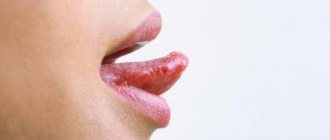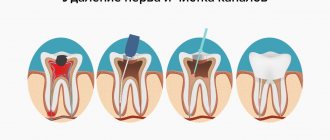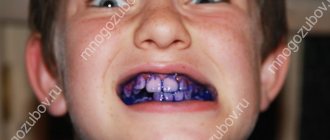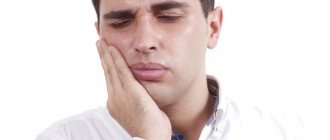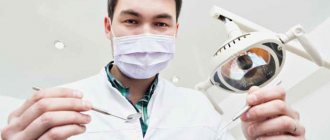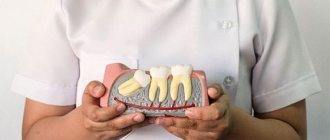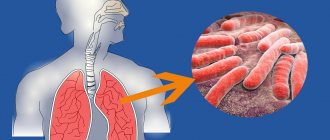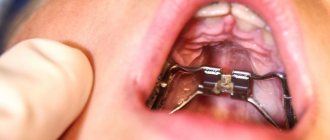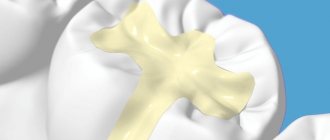It happens that an adult’s teeth itch, and he doesn’t really pay attention to it. Many people believe that this symptom cannot mean something bad, but in vain. Itching may indicate a serious illness. Therefore, doctors recommend that if any symptoms appear, you should go to the hospital.
Most often, itching occurs due to some dental disease. But it also happens that this symptom is the body’s reaction to an allergen. So, why do healthy teeth itch?
Itchy teeth - we need to identify the cause
Causes of tooth itching
Most people do not pay attention to such a symptom as itching in the teeth, but there are those who begin to worry about this. It is worth noting that teeth itch for various reasons. Sometimes it's really not a reason to worry. Therefore, if such a symptom appears, then you should just visit a doctor and find out whether there are any problems or not.
Itching is common with dentures.
Causes of itching in teeth:
- An allergy to any dental substances or toothpaste you use may cause itching in the area of your front teeth.
- Itching often occurs with dental ailments, such as periodontitis, gingivitis, stomatitis.
- Itching can occur due to thrush; many mothers may have observed a similar illness in their child. It manifests itself in the form of a white coating on the tongue, this is due to the fact that the protective functions of the baby’s body do not work well.
- Often a similar symptom manifests itself in adults who are constantly on diets. This occurs due to the fact that insufficient amounts of vitamin C and zinc enter the body.
- Itching can be caused by stress.
- The tooth may itch after filling the canals; this is the negligence of the doctor filling the canals, who did his job in bad faith. Also, a similar symptom appears during the eruption of wisdom teeth.
- Itching can occur with colds and viral diseases such as FLU, ARVI and acute respiratory infections.
These are the main reasons for the appearance of such an unpleasant symptom, but there may be others.
It happens that a pregnant woman or a small child’s front teeth begin to itch.
In the second case, the baby is 100% teething. But why teeth itch during pregnancy is not clear.
How to behave after tooth filling
The first time after installing the filling, it is advisable to follow these recommendations:
- Don't eat too hot or cold.
- Smoking less.
- Avoid sweets.
- Do not chew with filled teeth, try to reduce the load on them as much as possible.
- Give preference to soft and liquid foods that do not need to be chewed.
After a few days, the filling will take root and you can return to your usual diet. It is usually not difficult to understand when the teeth are again ready for the “exploits” of biting into hard cookies.
Of course, it is not very pleasant when a tooth hurts after filling canals or installing a regular filling. But such discomfort is the final stage. All the worst in the form of caries and pulpitis is already behind us, at least for some time.
healthy-teeth.su/bolit-zub-posle-plombirovaniya-pochemu-chto-delat.html" healthy-teeth.su
Why does a tooth hurt and ache after filling when biting?
A visit to the dentist does not always guarantee immediate relief from unpleasant sensations in the mouth. Why does a tooth hurt after filling, and when should you seriously worry about it? Do I need to go to the doctor again or can I solve the problem myself?
Why do teeth itch during pregnancy?
Every person knows very well that during pregnancy, cardinal changes occur in the female body. This is a natural biological process, because now the fair sex must monitor not only her own health, but also that of her unborn child.
Preliminary studies have shown that almost 50% of pregnant women experience toothaches that are not associated with anything.
No one previously understood why many girls experience itching and pain in their gums during pregnancy. But a logical explanation was still found. While carrying a child, the expectant mother's hormonal levels completely change, and the endocrine system begins to function differently. During pregnancy, the female body gains strength for future childbirth and because of this, problems with teeth, hair and even nails arise. This is because the expectant mother’s body does not receive enough vitamins and microelements.
Gingivitis is a cause of itching in pregnant women
Therefore, very often pregnant women go to the dental clinic with complaints that their teeth itch. And the cause of this symptom is often gingivitis. This disease most often progresses in the first trimester of pregnancy. This happens due to the fact that during this period the skeleton of the unborn child is formed. Therefore, all the vitamins that are necessary for bones are given to the baby.
If during pregnancy the gums between the teeth itch, this is the first symptom of gingivitis. Pain and swelling may also occur. During this disease, the teeth become very sensitive to cold and hot. Therefore, if you have identified one of the symptoms, you should urgently visit the dentist. Remember that all illnesses during a woman’s pregnancy directly affect the child.
Initial periodontal disease is always accompanied by itching
Itching in the gums during pregnancy
During pregnancy, a woman’s body undergoes various and not always pleasant changes. Dental problems are no exception.
Attention! Even if a woman carefully monitors her dental health and maintains oral hygiene, she may experience such unpleasant phenomena as itching in the gums, inflammation, and exacerbation of existing dental diseases.
Doctors say that more than half of pregnant women complain of dental problems, even if everything was fine before pregnancy. All these processes are explained quite simply:
- During pregnancy, the hormonal background of the female body changes, which cannot but affect the functioning of many organs.
- Changes also occur in the functioning of the nervous and autonomic systems.
- The future baby, growing in a woman’s belly, requires a large amount of vitamins, macro and microelements, and other nutrients, which it takes from the mother’s body. Therefore, bearing a child does not have the best effect on the health of teeth, nails, hair, and skin.
Pregnant women often come to the dentist complaining of itching and bleeding gums. Gingivitis, which was already mentioned above, often occurs in women already in the first trimester of pregnancy. Doctors know why this happens.
Due to hormonal changes in the body of a pregnant woman, the blood supply to the mucous membranes deteriorates. The gums become more sensitive, slightly swollen and easily damaged when brushing your teeth. The consequence of all this is gingivitis in pregnant women.
The fact is that it is at this time that the skeleton begins to form in the fetus, so it requires a lot of calcium, fluorine, phosphorus and other important elements. The female body gives everything it needs to the unborn baby, losing many useful substances.
Why does itching occur after tooth extraction?
If your gums itch after tooth extraction, then don’t panic, wait a couple of days. If the itching does not go away after a while, then you need to consult a dentist. It often happens that after tooth extraction, the doctor did not properly treat the edges of the socket and because of this, the gums begin to itch.
There are also other reasons for itching after tooth extraction, including:
- During the operation, the doctor touched a nerve with an instrument, which caused an injury;
- did not completely remove the dental bone;
- infection in an open wound.
What to do in this situation? If there is an itching or unpleasant sensation at the site of tooth extraction, you should first visit a doctor. If this is not possible, then carefully examine the wound; it may be that an inflammatory process has begun. In this case, you can help yourself by rinsing, chamomile decoction or a solution of soda and salt. This will relieve some of the inflammation, but you should visit a doctor as soon as possible.
When your gums hurt
If the filling material goes beyond the boundaries of the tooth root, the soft periodontal tissues will be affected and an inflammatory process in the gums will begin to develop, which will be accompanied by severe pain.
The gums also become painful if the nerve is not completely removed and infected tissue remains after the filling material is installed. Its suppuration and inflammation will begin, which turns into purulent pulpitis, periodontitis and further, into gumboil. All this will be accompanied by intense pain, both during chewing and at rest, swelling of the jaw, and increased temperature. To avoid possible complications, if such symptoms occur, you should immediately contact a dental surgeon. He will open the abscess, disinfect and drain it.
The reason may also be the actions of the dentist, who touched the gum when placing the filling, but this discomfort goes away quickly.
What folk remedies will help reduce pain:
- rinsing the mouth with a solution of salt and soda;
- applying cotton wool soaked in an infusion of lemon balm and valerian or in a tincture of calamus root to the filling site;
- rinsing with herbal decoctions of sage, calendula, yarrow, chamomile, mint with the addition of oak bark and propolis;
- hold a cotton wool soaked in fir oil (5 drops) in the teeth that have been treated, but make sure that the cotton wool does not touch the gums, otherwise a burn may occur;
- applying a piece of ice to the disturbing area (hold until completely melted); as an alternative, you can use frozen herbal decoction;
- after eating, rinse your mouth with a solution of soda with the addition of a couple of drops of iodine;
- wiping the troubled areas with a cotton swab and clove oil.
Among the medications that will help: tempalgin, nurofen, ketanov, ketorol, dexalgin, ketorlak, baralgin, analgin, etc.
A tooth may hurt due to the fault of a dentist who treated it incorrectly or poorly, and what other reasons are there:
- Carious relapses. The service life of the filling material is five years. After this, it will not provide reliable protection to the tooth from infection, and caries resumes.
- Cyst. Its development is asymptomatic for a long time and therefore goes unnoticed during treatment.
- Filling not adjusted to the bite. If you press on it when biting (front tooth) or chewing food (molar), discomfort and pain will be felt, as the soft tissues will be irritated.
Why does a tooth under a filling itch:
- prolonged exposure to stress;
- exposure to allergens: toothpaste, certain foods, dentures, briquettes;
- lack of ascorbic acid;
- candidal stomatitis;
- acute respiratory infections and flu;
- large-scale deposits of tartar or plaque on the teeth.
What to do after the tooth has been correctly and successfully treated? Give up for a couple of days:
- smoking;
- too hot and cold food;
- confectionery products;
- chewing food on the side of the filled tooth;
- hard and rough food.
Diagnosing yourself without consulting a dentist can lead to serious complications. If a filled tooth bothers you for more than a month, the first thing you need to do is go to the dentist.
Itching under the filling
It happens that the tooth under the filling itches for no apparent reason; there may be several reasons. Most often, this indicates that he was treated poorly. If this is indeed the reason, then you need to carry out the procedure again. Itching may also occur due to an allergic reaction. Not all people are suitable for the drugs and materials used by dentists for dental treatment.
You should not try to get rid of the itching on your own. Indeed, in this case it occurs due to improper treatment. Only a dentist can help here, who will select individual and correct therapy.
There are situations when a tooth under a temporary filling itches; in this case, there is no need to panic. This symptom most often occurs due to the fact that temporary fillings are not installed tightly enough. After all, you still have to remove it and install it permanently.
Flux is the cause of itchy teeth
How to install a filling
To cure caries, it is necessary to fill the diseased tooth, which occurs in the following order:
- affected dental tissues are removed;
- the cavity in the tooth is processed;
- the bottom of the cavity is lined with a special gasket, which helps the formation of secondary dentin;
- a filling is installed;
- grinding the surface and creating grooves.
In case of advanced caries, when pulpitis has already developed, the doctor, under local anesthesia, will remove the damaged nerve, cure the pulp (apply medicine) and place a temporary filling.
A week later, if there are no complaints from the patient, the entire length of the dental canals is filled, and the tooth is closed with a permanent filling.
The use of anesthesia in the treatment of acute pulpitis requires high medical qualifications: blocking the sensitivity of a diseased tooth (using local anesthesia) leads to the dentist overdoing it and damaging the root wall, and this will cause periodontitis.
What other causes of itching exist?
It often happens that your teeth itch, but it is very difficult to understand why. In addition to the main reasons, there are also a number of individual ones that do not occur so often. Therefore, if your tooth itches, consult a doctor for help.
There is such a pathology as bruxism, which occurs very rarely. It appears when there is heavy load on the teeth, the gums expose the neck and root of the tooth. In such a situation, only an experienced dentist can help. He selects special mouth guards that need to be worn only at night. This makes it possible to reduce the load on the teeth.
It also happens that people themselves are the culprits of their disease. Mucosal injuries can often occur in children and adults. This occurs due to the fact that a person performs oral hygiene incorrectly and rudely. Against this background, wounds and erosions appear, which can lead to inflammatory processes. Therefore, familiarize yourself with the rules of oral hygiene and choose only the right toothbrushes.
People often experience allergic reactions, which manifest themselves as itching in the teeth.
And this happens not from some dental products, but from some products. If you notice that after eating a product your teeth become itchy, you should remove it from your diet.
How to strengthen your gums?
You should be attentive to your health - try to avoid injury to the mucous membrane and visit the dentist in a timely manner. To strengthen your gums, you can use the following tips:
- Take regular and thorough oral care;
- use high-quality hygiene products;
- minimize sugar consumption;
- include fresh vegetables and fruits in your diet.
Both an adult and a child can go to the dentist with the complaint of “itching teeth”. People who have a predisposition to the oral mucosa often suffer from a similar symptom. It is difficult for a person to concentrate on work or enjoy relaxation, because he is constantly mindful of his teeth.
Treatment of itching in teeth
You should not use medications to treat itching in teeth without a doctor's prescription. The wrong medicine can have a negative effect on the body. The treatment method is determined only by the doctor.
The most commonly used remedies to relieve itching are:
- If itching occurs due to allergies, then it is worth using antihistamines. But first you need to identify the allergen.
- People who suffer from psychological disorders are prescribed sedatives. After the person calms down, the itching will go away.
- For dental diseases, the doctor independently selects medications depending on the ailment.
Kalgel helps with itching
Causes of discomfort
Factors that cause the feeling that the inside of the tooth itches include the following:
- This is how the body reacts to a stressful state, especially if the situation lasts for a long time;
- Allergic reactions. They can appear on oral care products, incoming food, on foreign objects - fillings, braces and dentures - located in the oral cavity;
- Vitamin deficiency and hypervitaminosis. This condition is especially often provoked by a lack of vitamin C in the body;
- Fungal diseases of the oral mucosa, such as candidiasis. Its symptoms: itching and pronounced white plaque;
- Colds lead to itchy teeth. With colds and seasonal infections: parainfluenza and influenza, the gums often swell;
- Dental problems;
- Oral diseases.
The latter include the following diseases:
- Catarrhal gingivitis. It occurs under the influence of external factors and organic problems, mainly related to the digestive system. Characterized by constant itching, bleeding gums, changes in their color - they turn purple or blue, and the appearance of bad breath;
- Chronic periodontitis. This disease of the soft tissues of the gums is accompanied by microbial allergies in most cases. The gums bleed, plaque appears on the teeth, aching pain is constantly felt in the oral cavity and severe itching occurs;
- Herpetic stomatitis. This disease is transmitted by direct contact, by airborne droplets and through household items, and is diagnosed in adults and children. Penetrating into the body, the herpes virus can remain dormant for a long time, but under unfavorable factors that cause a decline in immunity, the disease begins to worsen. Its symptoms: plaque on the oral mucosa, papules with liquid, which, when ruptured, form ulcers and erosions that can itch and hurt;
- Leukoplakia. This is the name given to white spots on the mucous membranes, the appearance of which is accompanied by burning, numbness, and itching. It can occur in smokers, since this bad habit causes pathological changes in the flora in the oral cavity, or is one of the symptoms of a precancerous condition.
If an adult’s teeth itch, you should definitely consult a dentist. It is this doctor who provides assistance with all processes occurring in the oral cavity.
It is not always possible to independently determine the affected area in order to understand why the gums between the teeth itch. In many cases, it is impossible to see a defect in the oral mucosa without special devices.
What to do if your teeth itch
It is impossible to get rid of itching on the teeth without eliminating its cause. So, if the discomfort is associated with an allergy, you need to eliminate its source. If, for example, an itching sensation appears in the depths of a tooth that has recently been filled, most likely the problem is in the filling material. In this case, the filling needs to be changed, otherwise much more serious problems will appear after the itching.
If the discomfort is caused by stress, you need to wait until it goes away completely. If the stressful situation is prolonged, the therapist may prescribe sedatives to the patient. This will ease the condition.
As for fungus and all diseases of the oral cavity, only a dentist can handle them. Firstly, he will prescribe suitable treatment, and secondly, he will carry out professional cleaning of the oral cavity, remove tartar and plaque. After this, the itching will quickly subside. In addition, to speed up its removal, you can lubricate your gums with sea buckthorn oil.
To avoid most of the problems described, you need to regularly visit the dentist's office for preventive purposes. In addition, you should only go to trusted specialists who use high-quality materials and sterile instruments in their work.
The article was written by a dentist with more than 15 years of experience.
Conditions in which patients have itchy gums fall, in principle, into two categories: either itching of the gums occurs due to chronic inflammatory diseases of the gums and mucous membranes, or it can be the result of a local or general allergic reaction.
Why does a tooth hurt after filling?
Almost all people have a toothache under a filling immediately after its installation.
Discomfort increases when eating or inhaling cold air. This is a normal occurrence due to the dental procedure and the damage to nerve endings in the process. The pain may last for several days. Usually it is not too intense and is aching in nature. If a tooth hurts after root canal filling, the recovery process will take a little longer – up to 3-4 weeks. It is important to note that every day a person’s condition should improve until the pain goes away.
Why do gums itch and how to treat it?
Below we will analyze in detail the main reasons why gums itch in an adult or child, and you will also learn about the therapy necessary in these cases.
- Chronic inflammation of the gums (gingivitis, periodontitis)
– the most common reason why gums itch is the presence of chronic catal gingivitis (Fig. 1, 2). In this regard, in addition to itching, the patient may have the following accompanying symptoms: → bleeding gums when brushing teeth, → swelling, bluishness or redness of the gums adjacent to the teeth, → bad breath.If itching in the gums appears against the background of periodontitis (Fig. 3), then the itching (in addition to the above symptoms of gingivitis) may be accompanied by one or more symptoms, such as: → mobility of the teeth, → exposure of the roots of the teeth (recession of the gums), → suppuration from periodontal pockets, etc.
Treatment of itching in the gums due to gingivitis and periodontitis –
Treatment should begin with a visit to a periodontist. Because gum inflammation is caused by poor oral hygiene, which accumulates soft microbial plaque, as well as hard supra and subgingival dental plaque. It is plaque and dental deposits that cause inflammation of the gums and itching of the gums.
Those. The main treatment will be to remove dental plaque. And only after this can anti-inflammatory therapy be carried out (antiseptic rinses, applications with anti-inflammatory gels). Without removing the cause of inflammation - tartar and plaque - anti-inflammatory therapy will be ineffective.
Ultrasound removal of hard tartar: Before and After photos
- Chronic inflammation of the oral mucosa
- This is the second most common cause of itching in the gums, which is especially common in smokers. There are diseases of the mucous membrane, such as: → (Fig. 6-7), → (Fig. 8), in which there may be itching in the gums.Carefully examine the visible mucous membrane of the mouth and tongue in the mirror. If you see various rashes, spots, erosions, blisters on the mucous membrane, then you have one of the diseases of the mucous membrane. In this case, you need to urgently go to the doctor.
If you haven’t noticed, keep in mind that the affected areas of the mucous membrane may be localized in areas of the oral cavity that are inaccessible for visual inspection by the patient himself. Remember that in the worst case, itching can be a consequence of the presence of malignant neoplasms.
- Itching in the gums due to low-quality dentures
– if we are talking about removable dentures, then there is only one reason – an allergic reaction, which occurs only when the denture is made poorly (it contains an excess of monomer, which causes allergies).When it comes to crowns and bridges, itching in the gums can occur due to galvanosis of the oral cavity, which occurs if the teeth have crowns made of dissimilar metals (for example, stamped crowns). In this case, both removable dentures and artificial crowns must be replaced.
Allergic reactions
– this may be a food allergy to one of the products (fruits, vegetables, nuts, spices, honey, chocolate, preservatives, dyes, stabilizers, etc.), but also very rarely allergic reactions can occur to some components of toothpaste. In this case, you need to try to eliminate allergenic foods from your diet and change your toothpaste.
If the gums itch, this may also be a consequence of a systemic allergic reaction (for example, to medications taken orally), and not just a local allergy, which occurs through contact when various allergens come into contact with the mucous membrane. This happens because allergens and allergy mediators (histamines) are carried throughout the body through the bloodstream.
- the presence of an open wound (ulcer, erosion) on the oral mucosa cannot be ruled out. Healing wounds may also be characterized by itching.
- Bruxism
sometimes causes itching of the gums. This usually occurs against the background of the fact that the teeth experience overload, as a result of which the gums begin to recede and the necks and roots of the teeth are exposed. If you have bruxism, then you need to go to an orthopedic dentist and have special mouth guards made for your teeth. These mouthguards are put on before bed and help reduce traumatic stress on the teeth.
( 15
ratings, average:
3.73
out of 5)
Complaints about itchy teeth are a common occurrence in dental practice. Although in fact people feel itching on the gums and mucous membranes. Why does this happen and what should be done in such cases? Let's find out together.
How should the above diseases be treated?
Such inflammations are a consequence of unscrupulous daily oral hygiene, which is why yellow plaque, consisting of microbes and their waste products, accumulates on the enamel, as well as hard dark stone, which causes irritation of the delicate tissues of the mucous membrane.
First of all, of course, you should contact a periodontist. He will quickly and efficiently remove all types of deposits on the teeth, and then provide anti-inflammatory treatment: he will prescribe rinsing with antiseptic and antimicrobial solutions, applying applications with anti-inflammatory ointment or gel.
Sometimes the causes of itching in the gums can be chronic inflammatory processes in the mucous membrane. As a rule, such diseases occur in smokers and people who ignore regular hygiene.
The most common among them are the following: candidiasis (fungal infection of the oral cavity), leukoplakia, stomatitis (aphthous and herpetic).
Stomatitis is the cause of itching in the gums
To diagnose one of these ailments, you should use two mirrors to carefully examine the entire mucous surface of the oral cavity, including the area of the cheeks and tongue. The presence of pathology will be indicated by any foreign elements: rash, sores, blisters, wounds, spots, areas of redness, whitish or yellow films, etc.
If any defects are found, you should immediately contact your dentist. If you feel itching in a place inaccessible to view, you should also go to a specialist, since fungi and stomatitis are often located in far corners. And sometimes the cause of such scratching may be the presence of oncological formations.
Causes of tooth itching
Like a number of other diseases, itching has several common causes. These are the reasons:
- Plaque or tartar.
Itching in this case is their symptom along with bleeding gums and the appearance of bad breath. - Chronic stress.
If you are constantly nervous and worried, itching of teeth is a psychosomatic reaction of the body. In this case, you need to take a course of valerian or other sedatives. - Allergic reactions.
Often, selected metal structures (braces or crowns) simply do not “get along” with oral bacteria. This is an individual intolerance that leads to allergic reactions in the form of swelling. Expensive metals, as a rule, do not cause allergies, which cannot be said about economical options. - Incorrectly selected toothpaste.
Sometimes both children and adults can develop allergies to pasta. If your gums itch during or after brushing, then the problem is probably in the paste. Change it, choose the right one. - Inflammatory diseases.
Itching is often a symptom of stomatitis and gingivitis, pulpitis and periodontal disease. - Vitamin C deficiency.
Analyze your diet. If it contains few vegetables, citrus fruits, apples, then perhaps the lack of ascorbic acid is one of the causes of itchy teeth. After all, this is how you can get scurvy. - Fungal diseases.
If there are white spots and plaque in the oral cavity, then it is quite possible that this is candidiasis, that is, thrush. This happens more often in children who constantly put everything in their mouth. Treatment of oral thrush is complex. This is therapy with antifungal drugs and vitamins, diet. After healing, the itching of the teeth also goes away. - Teething.
This happens when baby teeth are replaced by permanent ones. In such cases, it is recommended to consult a pediatrician and pediatric dentist. - Changes in the composition or acidity of saliva.
This reason is determined after special studies and tests in a dental clinic.
How to quickly help your baby
- If your child's teeth itch during teething, you should give the baby a special teether. It needs to be frozen before doing this. The ice will numb the gums and your teeth won't itch as much.
- If you have thrush, you should treat the affected surfaces with a soda solution as often as possible. In addition, antifungal drugs are effective. Therefore, if your baby has a white coating in his mouth, refuses to eat and constantly tries to scratch his teeth, you should immediately seek help from a pediatrician or pediatric dentist.
- In case of allergies, allergy tests are carried out first. Avoiding the wrong toothpaste or product will cause symptoms to go away quickly.
Thus, the problem of teeth scratching can be eliminated very quickly if the cause of this condition is correctly identified. And this requires consultation with a dentist.
The article was written by a dentist with more than 15 years of experience.
Conditions in which patients have itchy gums fall, in principle, into two categories: either itching of the gums occurs due to chronic inflammatory diseases of the gums and mucous membranes, or it can be the result of a local or general allergic reaction.
Teeth itch: what to do?
The first aid for itchy teeth is more thorough hygiene. This is the basis of treatment for both children and adults. First, you should change your toothbrush. Buy a new one with soft bristles. If after this it does not become easier, perhaps you should change your usual toothpaste and buy a medicated one.
You can try rinsing your mouth with a soda solution or decoctions of oak bark and chamomile. A decoction is prepared from one tablespoon of chamomile or oak bark by brewing in a glass of water. After infusion, the liquid is filtered and the mouth is rinsed. This should be done several times a day.
If, after such simple measures, your teeth still continue to itch, then you cannot do without consulting a dentist.
Prevention
Any health problem requires proper treatment. In the case of teeth, it is not always possible to correctly determine the cause of itching and eliminate it yourself. And it’s even better to avoid such situations altogether. Therefore, you need to adhere to a few basic rules so that tooth itching does not bother you:
- You should brush your teeth twice a day and rinse your mouth after eating.
- Select and buy quality toothpastes. Your dentist will help you make the right choice after examining your teeth. Don't skimp on toothpaste.
- Visit your dentist at least 2 times a year for preventive care. This will make it possible to avoid caries and other problems, including dental itching.
- As soon as your gums start bleeding, go to the dentist. Do not delay treatment and do not allow the disease to worsen. After all, not all causes of diseases of teeth and gums can be found out on your own, much less correctly eliminated. Sometimes traditional medicine simply cannot cope with diseases that are treated with medications and purely individually.
When turning to the dentist, the patient expects that filling, removal of the nerve and the tooth itself, in case of emergency, will bring long-awaited relief and comfortable sensations in the oral cavity.
However, sometimes expectations are not fully met, for example, there is a strange feeling that the tooth under the filling is itching. The gums may or may not hurt, but the constant desire to “scratch the inside of the tooth” does not give rest. Why does this happen and what to do in such a situation?
What to do
Before you begin to get rid of dental itching, it is necessary to establish the exact cause of its occurrence, based on which methods for eliminating the unpleasant phenomenon are selected.
It is quite possible that if the tooth itches under the filling, it will have to be treated again, and you need to be prepared for this. In any case, you should definitely consult your doctor.
What you can do to get rid of annoying itching in your teeth:
- If you use an unfamiliar paste, change it to a proven one or follow the dentist’s recommendations when choosing a hygiene product.
- Replenish your diet with fruits and vegetables containing vitamin C to solve the problem of vitamin deficiency. Apples, lemons, orange juice, black currants, cabbage, and herbs will be useful in this case. You can take a course of vitamin therapy prescribed by a specialist.
- Get rid of the fungus by undergoing treatment with antifungal drugs.
- Take antihistamines if the cause is an allergy, then be sure to identify and eliminate the allergen.
- Analyze whether new foods have been introduced into the diet that provoked itching. Having identified them, remove them from the diet.
- Undergo a course of treatment with sedatives to normalize the neuropsychological state in case of itching due to stress.
- Do not panic if the tooth itches soon after removal, but wait a couple of days. The itching may disappear on its own, otherwise, contact your dentist. In addition, you can try to relieve the inflammatory process by rinsing with a chamomile decoction or a solution of soda and salt.
If the symptoms do not go away on their own, the dentist will select the necessary therapy. Can be assigned:
- Tests or scraping of plaque from the inflamed mucous membrane.
- Local preparations (rinses, gels, ointments).
- For more serious problems, antibiotics are prescribed.
- Candidiasis can be treated with a solution of methylene blue, Furacilin, diluted by Lugol, products with Clotrimazole, Nystatin, Fluconazole.
- For gingivitis and periodontal disease, tartar and plaque are removed and the oral cavity is treated with antiseptic ointments and solutions, and for acute pain, non-steroidal painkillers are indicated.
- For stomatitis due to herpes, Acyclovir in the form of ointments and tablets, Zovirax, Oxolinic ointment or immunoglobulins Anaferon and Viferon will be prescribed.
As phytotherapeutic agents, experts may recommend treating damaged membranes with sea buckthorn oil or using mouth baths made from decoctions of medicinal plants that have antiseptic and regenerating properties.
If, after installing a temporary or permanent filling, one-time itching in the teeth occurs, the following may be effective:
- rinsing the mouth with a saline-soda-iodine solution.
- chewing solid food.
- ice resorption.
For symptomatic treatment, the use of special sprays to relieve pain and itching is also effective.
This method can be recommended to parents of small children whose children do not yet know how to endure unpleasant itchy sensations.
But it is undesirable to abuse this method to avoid side effects.
Sprays for children can be replaced with the same sea buckthorn or tocopherol acetate solution, which can be used to treat the mucous membranes, using it for a longer period of time without consequences.
It is impossible to get rid of annoying itching in the teeth by scratching them from the inside, so you need to look for the cause and eliminate it. If the symptoms do not indicate anything, you should make an appointment with a specialist as soon as possible. He will examine the oral cavity and select effective treatment.
But it is worth noting that itching can also appear for no reason. Therefore, it is enough to observe for several days and if the symptom goes away and nothing bothers you anymore, then there is no need to worry. But if the itching remains or intensifies without subsiding for a long time, you need to seek help. This innocent symptom may indicate serious dental problems. Be healthy!
zubki2 /bolezni-zubov/plomby/cheshetsya-zub-pod-plomboy.html» zubki2
Why teeth may itch, cause and treatment methods.
It happens that an adult’s teeth itch, and he doesn’t really pay attention to it. Many people believe that this symptom cannot mean something bad, but in vain. Itching may indicate a serious illness. Therefore, doctors recommend that if any symptoms appear, you should go to the hospital.
Most often, itching occurs due to some dental disease. But it also happens that this symptom is the body’s reaction to an allergen. So, why do healthy teeth itch?
Itchy teeth - we need to identify the cause
Why does a tooth itch under a temporary (regular) filling?
If dental treatment is carried out with violations of hygiene standards and technologies, inflammatory processes may develop in the oral cavity.
The most common complications are:
- – inflammation of the mucous membrane of the gums;
- – inflammation of the mucous epithelium lining the oral cavity;
- – pronounced, accompanied by the release of pus, loosening of teeth and pain;
- – inflammation of the internal tissues of the tooth (pulp), due to infection.
Gingivitis after dental treatment
If the patient had signs manifesting itself in the oral cavity, the use of certain types of antibiotics during a dental procedure could worsen local immunity and intensify the development of fungal infection. Thus, itching may be due to exposure to fungus.
Allergic reaction to dental medications
In some cases, the agents used in treatment may interact with bacteria inhabiting the oral cavity, resulting in an allergic reaction with symptoms of swelling.
A similar situation arises if metal structures in the form or elements are placed on a filled tooth, which are incompatible with the gum tissue.
As a rule, products made from more expensive metals do not cause allergies, but in the case of using economy options, this is not excluded.
Allergic manifestations can also occur due to incorrectly chosen, inappropriate ingredients, the components of which have an irritating effect on the mucous membranes. This type of allergy is easy to recognize if a person notices that itching in the mouth appears immediately after hygiene.
Other reasons
The gums between the teeth can itch for a number of other reasons:
- In young children, a similar condition may occur in the background, and may not be associated with a recently installed filling.
- Adult patients get this problem because they are not careful enough, violating the rules of hygiene.
- Sometimes taking medications in the form of tablets or mixtures can change the acid balance on the surface of the mucous membranes or the composition of saliva, thereby causing discomfort. This reason also appears after some dental tests and studies.
- Lack of vitamins, especially vitamin C, can also affect the condition of the gums and provoke an itchy feeling in the mouth due to vitamin deficiency.
- Chronic stress causes dental itching of psychosomatic origin.
- Such an infrequent phenomenon as (jaw grinding at night) puts a lot of stress on the teeth, which can cause itching sensations.
- Often, children and adults experience microtraumas of the mucous membrane due to something wrong or rough. Because of this, wounds and erosions appear, which can lead to inflammatory processes and, accordingly, dental itching.
Thus, it is necessary to carefully analyze which cause in an individual case is the main one. And you can also detect the influence of a combination of factors. Therefore, it is still better to trust a good specialist.
Causes of pain after tooth filling
Untimely removal of defective areas of enamel over time causes the development of caries, which ends in advanced caries, pulpitis, periodontitis or granuloma.
You can often hear that you recently treated a tooth, but now it still hurts, why? Many people have noted that after the procedure there remains discomfort, which becomes stronger when exposed to cold air currents or when chewing. This “behavior” of the tooth is normal, because filling is a minor surgical intervention, and pain is the body’s response to damage to the nerve fibers. It lasts a couple of days, and if the cleaning was done correctly and after that a filling was placed, it is not too pronounced and feels like a “tooth ache.”
Video
If the tooth canals were filled, recovery will take longer - about a month, during which the pain should become less intense every day until it disappears completely.
But the degree of concern of the patient directly depends on how long there is aching pain after filling a tooth. It is important to pay attention to the nature of the pain: it hurts to chew, jerks from time to time in a calm position, or shoots constantly.
If the tooth hurts or the units located next to it ache, their sensitivity to mechanical stress has increased within 1-3 days after the visit to the dentist - this is normal. There is an individual sensitivity of everyone to dental procedures; how long the healing period will last depends on this. But, if a tooth is filled, and it doesn’t stop creating noticeable discomfort, you need to visit your dentist and determine the cause.
After a filling has been placed, the tooth may hurt for the following reasons:
- Violation during the filling process. Excessive or insufficient drying of the cavity before the filling is installed causes irritation of the nerve endings, which provokes pain. If the filling does not adhere tightly to the walls of the crown, harmful microorganisms will freely penetrate into the cavity, causing secondary infection of tissues and an inflammatory process.
- The carious lesion was not completely removed. If the tooth is very badly damaged, in addition to removing dead tissue, before placing a filling it is necessary to put medications into the cavity and install a temporary filling material. Doctors do not always follow this treatment protocol. After visiting the dentist, the pain may not only not go away, but also intensify, since the development of a new inflammatory process requires conditions without access to oxygen. Secondary infection with caries of an already cleaned cavity sometimes provokes pulpitis.
- Allergic reaction to filling material. Such cases are extremely rare and the doctor comes to this conclusion only after excluding all other options.
- Incorrect diagnosis. An inexperienced dentist sometimes confuses chronic caries and pulpitis, ending up placing the filling in the wrong place.
- Medical negligence – installation of filling material incorrectly or use of a cheap analogue.
- Failure to follow recommendations. The filling material finally hardens only after 2 hours. Any food or drink intake during this period will change the acidity of saliva, which negatively affects the tightness of the filling.
An increase in temperature is evidence of the development of a purulent process in the cavity. It is necessary to contact a dentist, who must correct his omissions. Also, sensitivity of the dental canals appears if pores were allowed to appear during the installation of fillings.
Video
Itching after tooth extraction
If the tooth could not be saved and it became necessary to remove it, gum damage occurs at the site of the operation. The wound, as a rule, heals on its own at home: it heals over time, and the gum surface is leveled.
Itching after tooth extraction may be associated with infection, in which case the following may occur:
- pain;
- impurities of pus;
- feverish conditions;
- deterioration in general health.
This happens if the doctor, after extracting the tooth, did not properly process the edges of the socket.
However, more often in this case, itching occurs due to the healing of the tissues of the wound surface.
Other reasons for the appearance of itching after extraction include: a nerve was touched by the doctor during the operation, or there was an incompletely removed tooth bone.
What else can cause your gums to itch?
In addition to the above factors, there are several other reasons that cause itching in the teeth and gums. Let's look at them.
- Bruxism (teeth grinding during sleep). The teeth of people suffering from bruxism experience increased stress. The consequence of this is the receding gums and exposure of the neck of the tooth and its root. In this case, you need to contact an orthodontist, who will select special night guards that reduce the load on the teeth.
- Injuries to mucous membranes. Some dental diseases cause wounds and ulcers to appear on the mucous membranes of the mouth. Rough brushing of teeth, hard foods, and picking teeth with foreign objects (toothpick, match, fork) can injure the delicate mucous membrane. As the wound heals, it will itch and itch.
- Poor quality or incorrectly selected dentures. Some patients suffer from allergies to removable dentures, or more precisely, to the material from which they are made. An allergic reaction can cause itching in the gums. Patients with dental bridges or crowns may develop galvanosis, which also causes itching. This happens if the crowns contain different metals. If your gums itch for these reasons, you should quickly contact your doctor and ask him to replace the crowns and dentures with ones that do not cause allergies.
- Allergic reactions.
Important! One of the factors that causes itching in the gums may be an allergy to certain foods or dental care products (toothpastes, mouthwashes). In this case, it is enough to simply stop eating foods that cause allergies and change hygiene products.For people prone to allergic reactions, it is better to use hypoallergenic toothpastes, powders and rinses. In some cases, the gums may itch if a person suffers from a general allergy (to pollen, certain medications, etc.). To eliminate itching, you need to treat the disease itself.
Regardless of the cause of the itching, you should visit a doctor and take the necessary measures to avoid further deterioration of the condition.
When asked what to do when your teeth itch very much, without thinking for a long time, they give the obvious answer: “You need to give a rubber ring. It’s your baby’s teeth growing.” Yes, with children the problem is easily solved. What to do if an adult’s teeth begin to itch? This situation also occurs.
Of course, it would be more correct to say that the gums itch, but sometimes the sensation is so strong that it really seems like the bone formations themselves are itching. Why does this happen and how to get rid of the unpleasant feeling?
